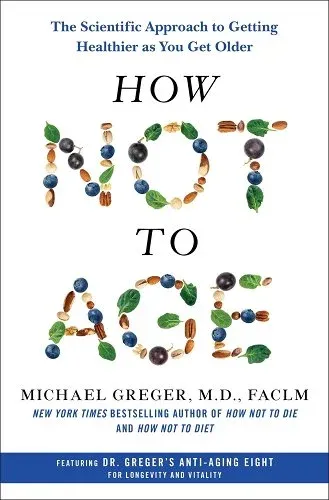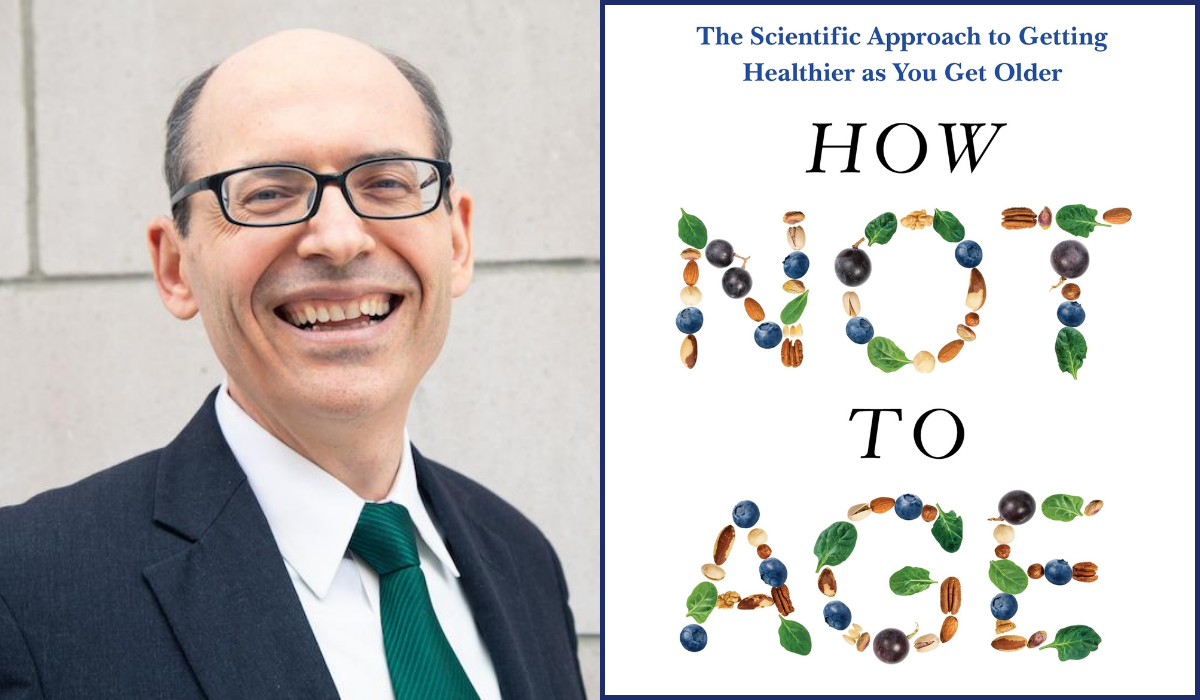In His New Book How Not to Age, Dr. Michael Greger Has the Tools for Living Better, Longer
The goal was to cut through all the noise and nonsense," says Michael Greger, MD about his new book How Not to Age: The Scientific Approach to Getting Healthier as You Get Older. "Dieting and anti-aging are multi-billion-dollar industries. With so much money in the mix, anyone seeking basic practical advice is faced with an inscrutable barrage of pills and potions."
Thankfully, Dr. Greger gives us that advice. His new book is filled with information to help us live well in middle age and beyond. It’s dense (he and his team filled the pages with meticulous research from the more than 20,000 studies and journals they reviewed) but utterly hopeful. "We have tremendous power over our health, destiny, and longevity," says the founder of NutritionFacts.org, "and that the vast majority of premature death and disability is preventable with a healthy enough diet and lifestyle."
So, of course, we reached out to Dr. Greger to find out what to eat, do, and watch out for.
A CONVERSATION WITH DR. MICHAEL GREGER
You write that you hope this book helps to add years to your life and life to your years. What does this say about how long we're living and how well we're living?
There's a study in the book that blew me away. The survey asked people, How long do you want to live? You had four multiple-choice options to answer, which were 80, 120, 150, or indefinitely. Two-thirds said they would prefer to only live to 80. Then the question was reframed as, How long do you want to live in guaranteed medical, mental, and physical health? Then, the most popular answer switches to an unlimited lifespan. This raises this concept of healthspan, the period of life spent in good health, free from chronic disease and disability. What's the point of living longer if we can't enjoy it vibrantly?
At the end of our book, you include 'Dr. Greger's Anti-Aging Eight.’ Will you walk us through what this is and what foods and things we should be eating and doing right now?
The Anti-Aging Eight was my trying to highlight specific foods and behaviors with the potential to offer some of the best opportunities to slow aging and improve longevity. It's kind of a checklist you can track.
Legumes
According to the Global Burden of Disease Study, the largest systemic analysis of risk factors in history, the largest life expectancy gains would be expected by eating more legumes: beans, chickpeas, lentils, lentil soup, and hummus. This is presumed to be because of the prebiotics. So, legumes have the most concentrated source of prebiotics in our diet, which then feed the probiotics—the good bacteria—in our gut, and this then produces a byproduct called postbiotics that can reduce inflammation, boost immunity, and improve muscle strength in frail individuals. So, legumes rule the roost when it comes to a per-serving basis.
Nuts
When it comes to a once-per-ounce basis, nuts rule. Nuts are associated with the lowest risk of premature death compared to any other food group. I recommend a palmful of walnuts a day, as walnuts appear to be the healthiest.
Dark Leafy Greens
Dark green leafy vegetables earned their place on the Anti-Aging Eight as the vegetable most associated with a longer lifespan. The nitrates in greens can improve age-related declines in muscle and artery function. Dark leafy greens can slow our metabolic rate, something you typically only see with severe caloric restriction, but instead of walking around starving all the time, you can eat a big salad.
Cruciferous Vegetables
Broccoli and cruciferous vegetables have a compound called sulforaphane, which improves immune function and boosts the detox enzymes in our liver and airways.
Berries
Berries earn their place as the fruit most associated with a longer lifespan. The anthocyanin pigments—the bright berry pigments—are thought to account for the benefits of cognitive function, eyesight, inflammation, blood sugars, artery function, and cholesterol. However, they get cleared from our bloodstream within about six hours, so I recommend dosing every meal with them; plus, they make a perfect dessert. I talked about the benefits of Amla, a dried gooseberry powder. You can also drink hibiscus tea, which has that ruby-red color from the anthocyanin pigments. Other [non-berry] sources that have [the anthocyanin pigments] include red or purple cabbage and purple sweet potatoes.
You said that we face "an inscrutable barrage" of things for anti-aging and dieting. Are we missing the mark regarding the health questions we're asking and the counsel we're seeking?
We are given the epidemics and pandemics of metabolic disease, obesity, and go on down the list. But that's just because of what we're bombarded by day in and day out. Take obesity, for example. It is not some moral failing; the battle of the bulge is the battle against biology. We're living in this toxic food environment, drowning in a sea of excess calories while being bombarded by ads for fast food and junk food. Becoming overweight is a natural, normal response to the unnatural abnormal ubiquity of these fatty, sugary foods concentrated in calories. And these foods happened to be the most profitable foods. No one is making money selling fruits and vegetables, right? They're perishable; they rot on the shelf. However, a snack cake that sits on the shelf for a few weeks that's how you make money. Or brown, fizzy sugar water in a bottle is all profit. The head of Coke is not plotting how to worsen the childhood obesity epidemic. They're thinking about how they can satisfy their shareholders' next quarterly earnings. That's how the system works. So, because these companies don't necessarily have our family's best interests at heart, we need to take responsibility for our health and family's health until the system changes. Because it is a matter of life and death.
This is all critical information that can still be overwhelming, particularly if we feel it's too late. In tandem with the foods you've suggested, where or how can we shift our mindsets to honor our health sovereignty in the face of these profit-focused companies and start living more healthily today?
I'm so glad about this. The concern about writing a book this comprehensive is that it can be a great reference book, but it is a little intimidating. And I don't want people to get lost in the weeds. That's why, if you look at the conclusion, this is about taking people back to the basics. Yes, there are all sorts of specific foods to eat and specific things to do. But let's not lose sight of the fact that one needn't make drastic changes. It's not all or nothing. Even basic, common sense lifestyle factors can mean the difference of living a decade longer. These are not smoking, not being obese, exercising regularly, and eating more fruits and vegetables. It's never too late—never too late!—to start eating healthier. It's never too late to stop smoking. It's never too late to start moving.
These common-sense behaviors really are where people need to start. The benefits are remarkable. Then, once they got the basics covered, they could look into all sorts of things. It's never too late. We really do have the power.
Thank you, Dr. Greger. And we're so curious: What did you have for lunch today?
I had pesto! I couldn't believe that I could find fresh basil this time of the year. I had whole wheat pasta with fresh basil, fresh parsley, walnuts, garlic, some fresh sweet cherry tomatoes, and then a purple sweet potato for dessert.

Michael Greger, MD, FACLM, is a physician and internationally recognized speaker on nutrition. His science-based nonprofit, NutritionFacts.org, offers a free online portal of thousands of health videos and articles. He is the author of the bestsellers How Not to Die, The How Not to Die Cookbook, How Not to Diet, and How Not to Age. Dr. Greger donates all profits he receives from his book sales and speaking honoraria to charity.
Please note that we may receive affiliate commissions from the sales of linked products.



